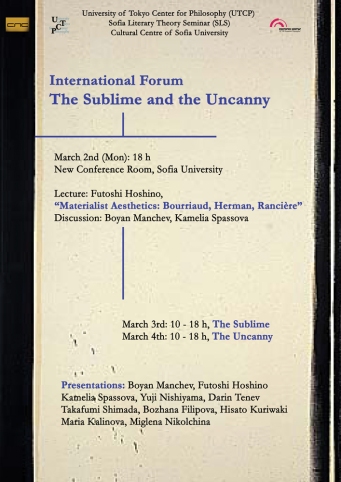
Дизайн: Камелия Спасова
Излезе от печат сборникът с текстове от международната научна конференция „Събитие и безсмъртие (литература, език, философия, наука), състояла се в Софийския университет (13-14 май 2011). В него на 338-348 стр. е включен общият ни текст „Ламела: органът на безсмъртното“:
Изтегли на pdf!
The collection of essays Event and Immortality (Literature, Language, Philosophy, Science) was published. It gathers proceedings from the eponymous conference, organized by the Faculty of Slavic Studies at Sofia University “St. Kliment Ohridski” and held on May 13–14, 2011. Our paper “Lamella: The Organ of Immortality” is included there from 338 to 348 pages.
Kamelia Spassova, Maria Kalinova
Lamella: The Organ of Immortality
Lacan introduces in his Seminar XI The Four Fundamental Concepts of Psychoanalysis the myth of lamella in order to explain in what way he developed the Freudian concept of drive. This myth is opposed to the Aristophanian myth of androgynous people, as told in Plato’s Symposium. The lamella is conceived as an unreal organ, and yet an organ, of immortality. The two philosophical myths presuppose two different frameworks for the reflection on the problem of the doubles. On the one hand, in Plato the two halves are erotically sublimated in their way to achieve the One. In Lacan, on the other, the lamella is the organ that gives birth to the doubles. The present paper attempts through a reading of Miglena Nikolchina and Alenka Zupancic to provide an answer to the following questions: Why is it that it is Aristophanes, the Father of Comedy, that is chosen to give a voice to the idea of the Androgyne; and in what way the Roman comedy in general, and the Menaechmi of Plautus in particular, produces the problem of the doubles as a means for the comic emplotment. The event is conceptualized as an explosion between the one and the other double, between Plato and Lacan, between immortality and the real.
Камелия Спасова, Мария Калинова
Ламела: органът на безсмъртното
Човек може да се отдаде на една мисъл, да я последва дотам, докъдето води, просто от научно любопитство или ако щете, като advocatusdiaboli,който не се обвързва с дявола.
Фройд, Отвъд принципа на удоволствието
1. Етика на желанието: Лакан – Бадиу
Защо психоанализата би била съвременният етически дискурс, ако трябва да бъде дефиниран човекът като безсмъртно същество? Отговорът предполага, че ние вече сме в ситуация, в която се е заличило илиe останало неразличимо разграничението между авторитет и нагон, между съзнанието за моралния закон при Кант и несъзнавано при Фройд. (още…)
 Invisible Battles: The Political Stakes of Literary Theory in Eastern Europe
Invisible Battles: The Political Stakes of Literary Theory in Eastern Europe Thursday October, 13, Södertörn University
Thursday October, 13, Södertörn University
